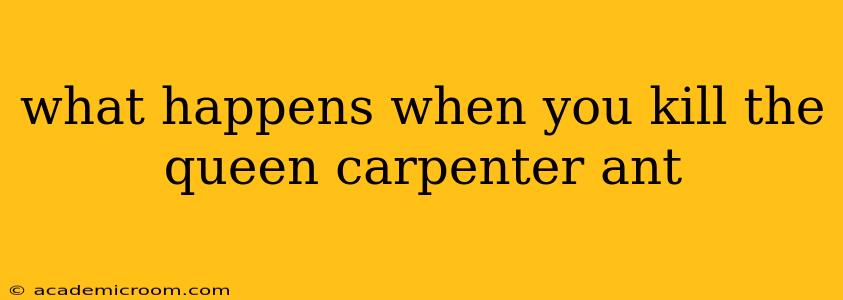Killing the queen carpenter ant has significant consequences for the colony's survival, impacting its structure, behavior, and overall lifespan. While it might seem like a simple solution to an ant problem, understanding the ramifications is crucial for effective pest control. This article delves into the effects of eliminating the queen and explores alternative, more sustainable methods for managing carpenter ant infestations.
What Role Does the Queen Play in a Carpenter Ant Colony?
The queen carpenter ant is the heart of the colony. She's responsible for reproduction, laying thousands of eggs throughout her lifespan, which can be surprisingly long – sometimes exceeding 20 years! These eggs are the foundation of the colony's growth and survival. Without a queen, there is no continuous influx of new ants to replace those that die naturally, and this is where the colony's fate hangs in the balance.
Does Killing the Queen Eliminate the Entire Colony?
While killing the queen is a devastating blow to the colony, it doesn't automatically lead to its immediate demise. The remaining ants will continue to forage, feed, and maintain the nest for a while. However, without new workers being born, the colony slowly dwindles. Older ants die, and there are no replacements, leading to a progressive decline in colony size and activity. This decline can take weeks, months, or even a year depending on the size and maturity of the colony at the time of the queen's death.
What Happens to the Workers After the Queen Dies?
The worker ants, initially unaware of the queen's absence, continue their established routines. However, as the food supply diminishes and the colony's overall strength fades, these workers become less efficient and more vulnerable to predators and environmental stressors. Their behaviour might shift, potentially increasing foraging attempts which can become more noticeable. They may also become more prone to internal conflicts and disorganization as the colony weakens and its internal structures break down. Ultimately, they lack the ability to reproduce, ensuring the slow, inevitable demise of the colony.
Will the Colony Produce a New Queen?
No, carpenter ant colonies don't have a mechanism to replace a deceased queen. There's no process of selecting or raising a new queen from existing workers. Their reproductive capabilities are limited solely to the queen.
What are the Alternatives to Killing the Queen?
Targeting the queen is impractical in most cases, as finding her within a large and complex nest is extremely challenging. More effective and sustainable ant control strategies include:
-
Professional Pest Control: Experienced pest control professionals use various methods to effectively manage and eliminate carpenter ant colonies, focusing on eliminating the entire nest through targeted treatments and bait stations.
-
Baiting Strategies: Using bait stations containing insecticides designed to attract and eliminate the entire colony, including the queen, is a common and effective method. The worker ants carry the bait back to the nest, and it spreads to the entire colony, including the queen.
Conclusion: A Sustainable Approach to Carpenter Ant Control
While killing the queen carpenter ant may seem like a quick fix, it's not a practical or reliable method for eradicating a colony. The best approach is to work with qualified pest management professionals who can employ targeted strategies that effectively eliminate the entire colony without the need to focus on the queen herself. Remember, long-term solutions and a proactive approach are far more effective than trying to target individual insects within a complex social structure.
